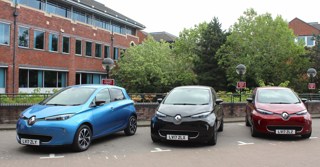Three-quarters (75%) of leased cars and 94% of the car rental fleet already comply with clean air zone requirements 15 months before the first zones are expected to begin operation.
The BVRLA’s Fleet Sustainability Credentials report, released to mark Green GB Week, says this is well ahead of the average for all UK cars, where only 57% meet CAZ emission requirements.
The leasing and rental industries are also leading the way for vans. Only 13% of the UK van fleet is currently CAZ-compliant, compared to 37% of all leased vans and 56% of the rental van fleet.
Gerry Keaney, chief executive of the BVRLA, said: “These figures show in no uncertain terms that our sector offers the fastest route to clean air in our urban areas.
“Our members offer a range of flexible and affordable solutions for every application and stand ready to assist individuals and businesses that are looking to replace older, more polluting vehicles with cleaner and greener options.”
Rental and leased vehicles are managed on a frequent renewal cycle and the BVRLA says this means the vast majority of the car and van fleet will be CAZ-compliant by 2020.
However, the report highlights the dilemma facing the commercial vehicle sector.
Several CAZ proposals stipulate that any HGV which does not meet the Euro VI emissions standard will face a daily fee of up to £100 to enter.
Currently, only 36% of the total UK HGV fleet is currently Euro VI, rising to 65% for rented and leased trucks.
As the lifecycle of a rented or leased HGV is significantly longer than that of a van or car, it will take longer for these vehicles to reach the second-hand market, where they can provide a more affordable option for fleets looking to acquire CAZ-compliant trucks.
Over the past 18 months, the BVRLA and its members have worked with local transport policymakers in London, Birmingham, Leeds, Derby and Nottingham to help them o devise fleet-focused air quality plans.
Earlier this year, the Government asked a further 23 local authorities to formulate plans to tackle local air pollution.
These plans could include the creation of several extra CAZs, with full proposals due to be submitted in December 2018.
The BVRLA has now written to all 23 authorities reaffirming its commitment to working collaboratively to ensure air quality plans are proportionate and effective.























Login to comment
Comments
No comments have been made yet.